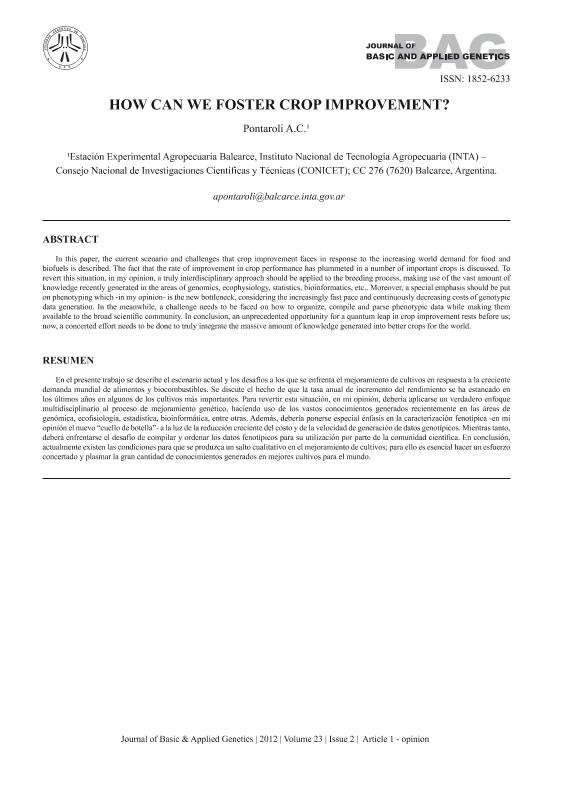Mostrar el registro sencillo del ítem
dc.contributor.author
Pontaroli, Ana

dc.date.available
2017-09-25T17:21:56Z
dc.date.issued
2013-02
dc.identifier.citation
Pontaroli, Ana; How can we foster crop improvement?; Sociedad Argentina de Genética; Basic and Applied Genetics; 23; 2; 2-2013; 4-6
dc.identifier.issn
1666-0390
dc.identifier.uri
http://hdl.handle.net/11336/25043
dc.description.abstract
In this paper, the current scenario and challenges that crop improvement faces in response to the increasing world demand for food and biofuels is described. The fact that the rate of improvement in crop performance has plummeted in a number of important crops is discussed. To revert this situation, in my opinion, a truly interdisciplinary approach should be applied to the breeding process, making use of the vast amount of knowledge recently generated in the areas of genomics, ecophysiology, statistics, bioinformatics, etc.. Moreover, a special emphasis should be put on phenotyping which -in my opinion- is the new bottleneck, considering the increasingly fast pace and continuously decreasing costs of genotypic data generation. In the meanwhile, a challenge needs to be faced on how to organize, compile and parse phenotypic data while making them available to the broad scientific community. In conclusion, an unprecedented opportunity for a quantum leap in crop improvement rests before us; now, a concerted effort needs to be done to truly integrate the massive amount of knowledge generated into better crops for the world.
dc.description.abstract
En el presente trabajo se describe el escenario actual y los desafíos a los que se enfrenta el mejoramiento de cultivos en respuesta a la creciente demanda mundial de alimentos y biocombustibles. Se discute el hecho de que la tasa anual de incremento del rendimiento se ha estancado en los últimos años en algunos de los cultivos más importantes. Para revertir esta situación, en mi opinión, debería aplicarse un verdadero enfoque multidisciplinario al proceso de mejoramiento genético, haciendo uso de los vastos conocimientos generados recientemente en las áreas de genómica, ecofisiología, estadística, bioinformática, entre otras. Además, debería ponerse especial énfasis en la caracterización fenotípica -en mi opinión el nuevo “cuello de botella”- a la luz de la reducción creciente del costo y de la velocidad de generación de datos genotípicos. Mientras tanto, deberá enfrentarse el desafío de compilar y ordenar los datos fenotípicos para su utilización por parte de la comunidad científica. En conclusión, actualmente existen las condiciones para que se produzca un salto cualitativo en el mejoramiento de cultivos; para ello es esencial hacer un esfuerzo concertado y plasmar la gran cantidad de conocimientos generados en mejores cultivos para el mundo.
dc.format
application/pdf
dc.language.iso
eng
dc.publisher
Sociedad Argentina de Genética

dc.rights
info:eu-repo/semantics/openAccess
dc.rights.uri
https://creativecommons.org/licenses/by-nc-sa/2.5/ar/
dc.subject
Breeding
dc.subject
Phenotyping
dc.subject
Genotyping
dc.subject
Interdisciplinarity
dc.subject.classification
Otras Agricultura, Silvicultura y Pesca

dc.subject.classification
Agricultura, Silvicultura y Pesca

dc.subject.classification
CIENCIAS AGRÍCOLAS

dc.title
How can we foster crop improvement?
dc.type
info:eu-repo/semantics/article
dc.type
info:ar-repo/semantics/artículo
dc.type
info:eu-repo/semantics/publishedVersion
dc.date.updated
2017-09-21T18:00:38Z
dc.identifier.eissn
1852-6233
dc.journal.volume
23
dc.journal.number
2
dc.journal.pagination
4-6
dc.journal.pais
Argentina

dc.journal.ciudad
Buenos Aires
dc.description.fil
Fil: Pontaroli, Ana. Instituto Nacional de Tecnología Agropecuaria. Centro Regional Buenos Aires Sur. Estación Experimental Agropecuaria Balcarce. Area de Invest.en Agronomia; Argentina. Consejo Nacional de Investigaciones Científicas y Técnicas; Argentina
dc.journal.title
Basic and Applied Genetics

dc.relation.alternativeid
info:eu-repo/semantics/altIdentifier/url/http://ref.scielo.org/wvhjrp
Archivos asociados
